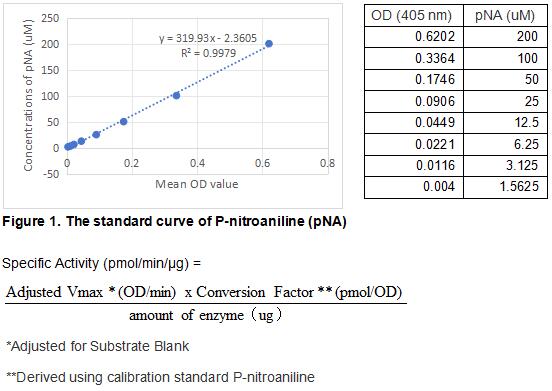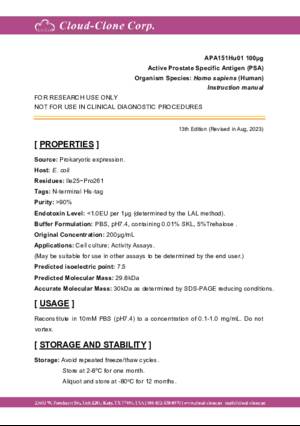Active Prostate Specific Antigen (PSA)
KLK3; APS; KLK2A1; HK3; KLKB1; Seminin; Prostate Specific Antigen; Kallikrein-Related Peptidase 3; Semenogelase, g-Seminoprotein; P-30 Antigen; Plasma kallikrein
- Product No.APA151Hu01
- Organism SpeciesHomo sapiens (Human) Same name, Different species.
- Buffer FormulationPBS, pH7.4, containing 0.01% SKL, 5% Trehalose.
- Traits Freeze-dried powder
- Purity> 90%
- Isoelectric Point7.5
- ApplicationsCell culture; Activity Assays.
- DownloadInstruction Manual
- UOM 10µg50µg 200µg 1mg 5mg
- FOB
US$ 274
US$ 686
US$ 1372
US$ 4116
US$ 10290
For more details, please contact local distributors!
ACTIVITY TEST

Kallikrein 3, commonly known as prostate specific antigen (PSA), is a serine protease of the human tissue Kallikrein gene family. PSA is synthesized in the ductal and acinar epithelium of the prostate gland and secreted into the seminal plasma in high concentrations (0.5 - 2 g/L). A small portion of PSA “leaks” into the systemic circulation, the levels of which increase significantly (30-fold) from prostate cancer tissue than normal prostate tissue. PSA has become a well established tumor marker that aids the diagnosis, staging, and follow up of prostate cancer. The activity of recombinant human KLK3 is measured by its ability to cleave a colorimetric peptide substrate Suc-Arg-Pro-Tyr-pNa in the assay buffer 50 mM Tris, 1 M NaCl, pH 8.0. The rhKLK3 is diluted to 200 ug/ml in activation buffer 50 mM Tris, 10 mM CaCl2, 150 mM NaCl, 0.05% Brij-35, pH 7.5, then activated with a final concentration of 1 ug/ml Thermolysin at 37 ℃ for 5min. Adding a final concentration of 10 mM 1,10 Phenanthroline to stop the activation. The activated rhKLK3 is diluted to 50 ug/mL in assay buffer. Loading into a clear well plate 50 µL of 50 ug/mL rhKLK3 and start the reaction by adding 50 µL of 2 mM substrate, with a substrate blank containing 50 µL assay buffer, 50 µL substrate, and no rhKLK3. Then read at 405 nm in kinetic mode for 5 minutes. The specific activity of recombinant human KLK3 is > 400 pmol/min/µg.
USAGE
Reconstitute in 10mM PBS (pH7.4) to a concentration of 0.1-1.0 mg/mL. Do not vortex.
STORAGE
Avoid repeated freeze/thaw cycles. Store at 2-8°C for one month. Aliquot and store at -80°C for 12 months.
STABILITY
The thermal stability is described by the loss rate. The loss rate was determined by accelerated thermal degradation test, that is, incubate the protein at 37°C for 48h, and no obvious degradation and precipitation were observed. The loss rate is less than 5% within the expiration date under appropriate storage condition.
GIVEAWAYS
INCREMENT SERVICES
-
 BCA Protein Quantification Kit
BCA Protein Quantification Kit
-
 Molecular Mass Marker for Protein
Molecular Mass Marker for Protein
-
 Monoclonal Antibody Customized Service
Monoclonal Antibody Customized Service
-
 Polyclonal Antibody Customized Service
Polyclonal Antibody Customized Service
-
 Protein Activity Test Experiment Service
Protein Activity Test Experiment Service
-
 Electrophoretic Mobility Shift Assay (EMSA) Experiment Service
Electrophoretic Mobility Shift Assay (EMSA) Experiment Service
-
 Buffer
Buffer
-
 Lentivirus Packaging Experiment Service
Lentivirus Packaging Experiment Service
-
 Adenovirus Packaging Experiment Service
Adenovirus Packaging Experiment Service
-
 Real Time PCR Experimental Service
Real Time PCR Experimental Service
-
 Spike RBD Protein (S-RBD)
Spike RBD Protein (S-RBD)
-
 Protein G
Protein G
-
 Protein A
Protein A
| Magazine | Citations |
| The Journal of Nutritional Biochemistry | Vitamin C supplementation prevents testosterone-induced hyperplasia of rat prostate by down-regulating HIF-1α ScienceDirect: S0955286309001181 |







